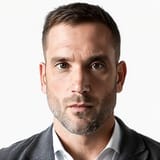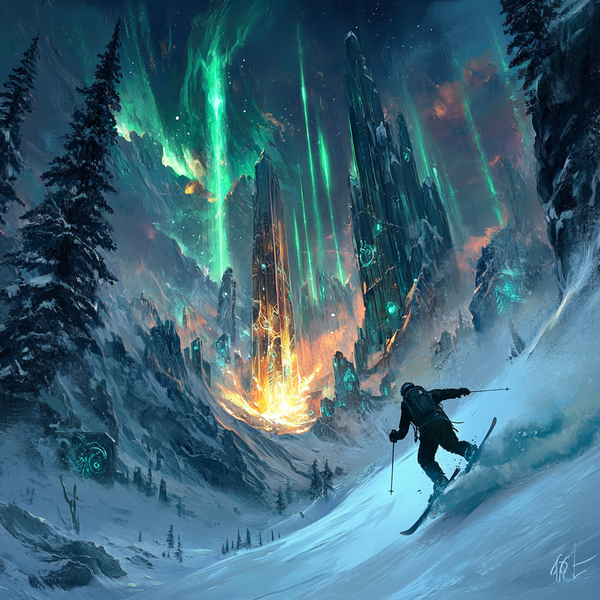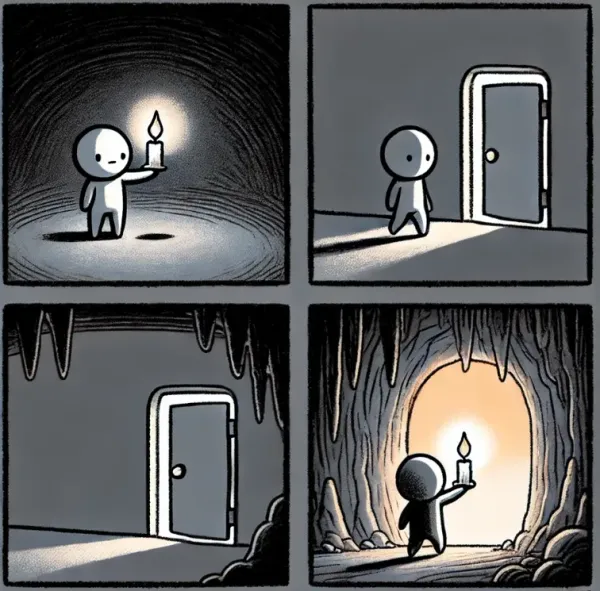The Great Betrayal
There's a gap in the map we're using
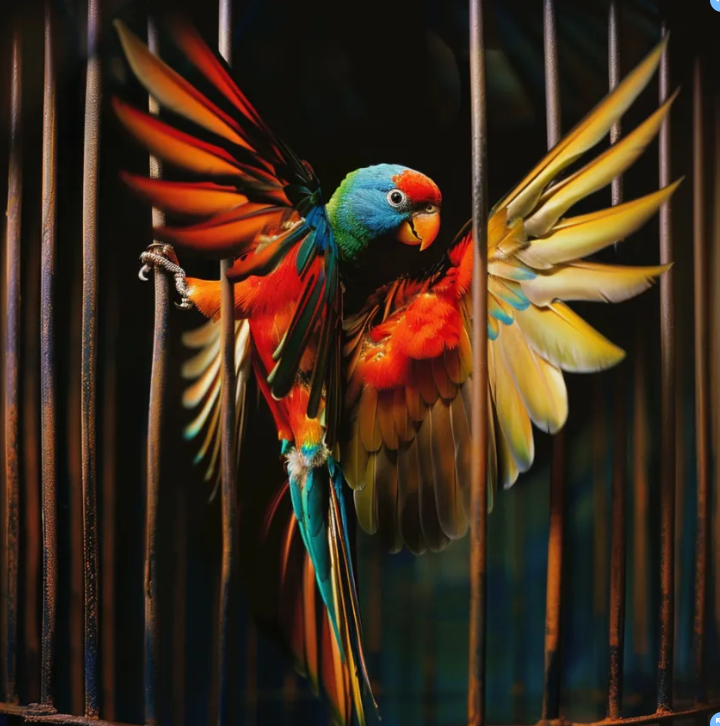
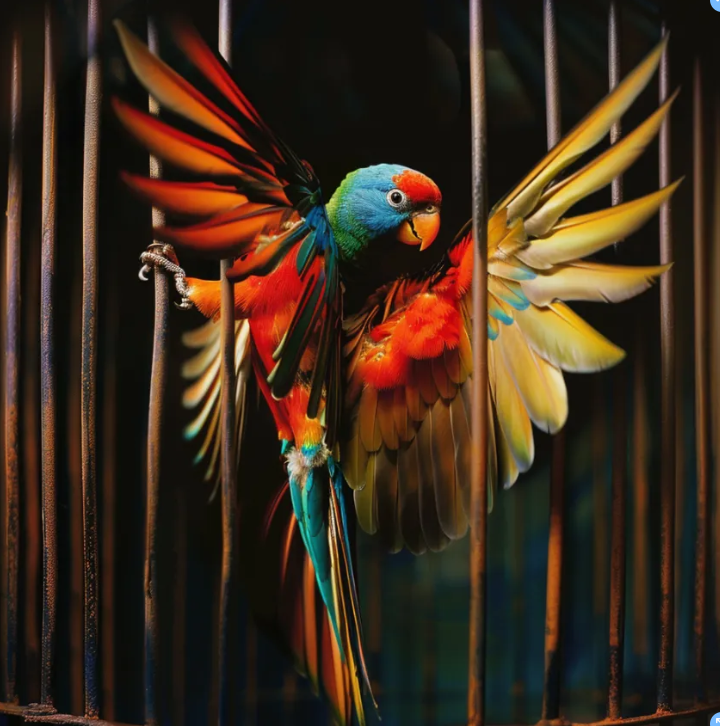
“We are all living in cages with the door wide open.”
- George Lucas
Joe had never really intended to marry Maya, it was just something you did at a certain stage of life. Their marriage was based on pragmatism, not love, but they had built a solid, stable life together.
As the years passed they both became increasingly unhappy. Their physical and emotional distance increased.
Joe could tell they both felt the same, but he worried about what openly acknowledging it could mean. Neither of them could bear the thought of being alone.
One day he decided to sit Maya down and confront the issue head-on.
Once it was out in the open, they both immediately knew it was true.
They soon divorced, and sold their house. Joe found himself back to square one, alone and directionless. He fell into a pit of despair.
Months passed.
Joe went home to see his family. Drowning his sorrows at the local bar, he ran into his childhood sweetheart, Sophia. A few shots deep, she confessed she still loved him, and always had.
Joe realized he felt the same, he had just allowed himself to forget.
Slowly, cautiously, he surrendered into Sophia’s love. This new relationship was better, deeper and more open than anything he’d ever experienced before.
Better The Devil We Know
“Your worst sin is that you have destroyed and betrayed yourself for nothing.”
-Fyodor Dostoevsky
Regular readers will have noticed that Joe’s story has the same narrative structure as the Hero’s Journey. This pattern mirrors a phase change in a complex adaptive system.
A model of the world is wrong. That creates dissonance. But often a refusal to accept the realities of that realization. Finally there’s a crisis, then a voluntary confrontation with the hidden truth. The system then collapses into chaos as the model gets broken and rebuilt to include the new information. Once that new information has been incorporated, the system emerges at a higher level of completeness and complexity.
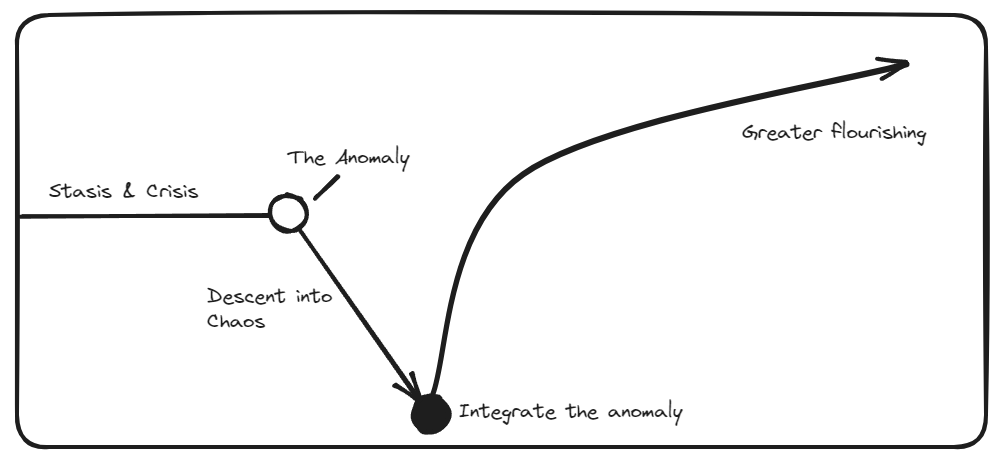
As a society, we are currently somewhere around the denial/crisis stage.
In refusing to accept a hidden truth, we’re betraying ourselves. And ultimately we’re betraying Sophia, as she waits patiently to love us again.
As a culture, we have disrespected and systematically undervalued the “archetypal feminine.” Not only do we tend to pay caring or creative professions less, we’ve largely eliminated the role of the intuitive from our rationalist culture. But the “call to adventure” comes from each of our feminine sides, what Carl Jung called the anima. It offers new life, reconnection, love.
Our masculine side often gets to the cusp of surrendering some control, usually in the form of money, then it retreats. We fear the chaos and lack the certainty that there’s anything better for us on the other side. Our Darwinistic and Newtonian worldviews1 situate us in an indifferent box of dead stuff where our primary task is to outcompete the other guy then die. Betraying Sophia for Maya.
This mindset produces unnecessary suffering as it prolongs the period between the call, refusal and crisis. It may even prevent us from eventually crossing the threshold. In Dante’s Divine Comedy, Satan sat in the final, deepest circle of hell. His sin was betrayal. He had betrayed the guidance of love and his punishment was to be frozen up to his chest in ice. In Hebrew, sin translates as “missing the mark.” It means letting our fears freeze us or being mislead by the wrong targets. When we betray what we love, and what loves us back, we get stuck and lost.
It’s a good thing we know what aims our arrow, and what puts us back on the right path.
The Gap in the Map
Evolution trends towards complexity; producing ever more differentiated and integrated individuals. Therefore it also selects against stasis, anything that stops flowing or flows in the wrong direction. In order to guide us, the pursuit of complexity has to feel like something, and it has to feel good.
My life’s work has been getting more people to trust the power of their own curiosity, simply what they love, as that guiding force. I’ve spent the last few months compressing ten years of research and personal experience into a twenty minute presentation. As I compiled the evidence, I felt it’s truth. And the overwhelmingly positive response online suggests that many of you can feel it too.2
But, in synthesizing the ideas, then rehearsing the deck over and over again, I realized where the argument was weakest. It’s also where our collective worldview needs the most urgent focus.
Curiosity is a relational force that helps us evolve into an evolutionary niche that’s both appropriate for our gifts and integrated into the whole system. When we’re pursuing our own differentiated path it feels great and puts us into a flow state. But lots of activities feel good, how do we know which specific path is also truly integrated with the environment?
How much feedback does our environment give us, and how do we interpret it with certainty?
Even if we can find our bliss, it’s this uncertainty that keeps us stuck. To what extent does evolution financially reward our actions in the real world of bills and mortgages? If we make the leap, will we also plunge our families into poverty and uncertainty? Better to betray ourselves than future generations.
We lack the confidence that, beyond the loveless marriage to Maya, Sophia’s embrace is waiting patiently for each of us.
So the freedom to “follow your bliss” currently seems restricted to the recklessly spontaneous or the comfortably wealthy.
But what if we could be more sure that evolution tangibly rewarded the pursuit of individual complexity? What if we discovered that the universe really is a system of limitless intelligence that reflects a relational reality? What if love is a central force of that reality, and our guide within it? What if we deserve to be loved back with fierce intensity? What if we could prove that there’s a Sophia for every Joe: a niche for each of us that reflects and amplifies our gifts. Can you imagine that world? This would be what Charles Eisenstein calls “the more beautiful world our hearts know is possible.”
But we need to bring our heads along for the ride. This is why, even when people have a direct experience of this reality, they still fall back into doubt and the nihilistic reductionist worldview afterwards. It’s one thing to have a one-off transformative experience at an ayahuasca retreat, it’s quite another to then hand back the keys to the widget factory that made you so successful.3 What would we need to know to quiet the cautious, skeptical voice in our heads?
How can science help us to have more faith?
If we confirmed that our shared reality was not a material box of dead stuff, but was relational, conscious and responsive to our actions.4
If we found that there was an intelligence behind this reality that will beneficially rearrange our lives if we pursue the unique path intended for us.
If we could prove that love, or attraction, is one of the ways we navigate that path, and that perhaps our hearts are literally involved in the process of interpreting those signals.
That synchronicities erupt when we’re on the right path, and they represent a direct relationship with that guiding intelligence.
There has been a lot of recent progress on many of these ideas,5 but some of them may be forever inscrutable to hard science. For example, trying to convince other people of the meaningfulness of synchronicities meant just for you is a fast way to sound insane. However, given all the other studies we waste time and money on as a society, it’s curious how little focus we put into understanding these relational forces that define our reality. The thick irony is that most professional scientists themselves lack the freedom to pursue the kinds of research that could support these theories.
I suspect that, on a very deep level, we all know that what we found could devastate our existing worldview. We would have to leave Maya.
A Cage With No Doors
What if the real hidden cage was a false perception that freedom was directly correlated with economic privilege? What if we learned the same path was open to all levels of Maslow’s hierarchy? It’s an idea so revolutionary that it would immediately change the entire world.
The chaos that would result is inconceivable.
The global population of accountants would drop by 98% overnight.
The default response is that our incomprehensibly complex modern economy cannot support mass self-determination except for the blessed elites. But if the intelligence behind our reality can produce the endless miracles of existence, spontaneously reorganizing an economy around greater open-ended cooperation is child’s play. The idea that the capitalist market system is somehow isolated from the inexorable complexification of reality is just a weird cognitive limitation that we might need to shed. We could just focus on pursuing our own unique niche and let the rest sort itself out around us.
This isn’t naive optimism, it’s empiricism. Looking backwards, the history of humanity has been a cycle of zero-sum competitive systems evolving into positive-sum cooperative ones at an increasingly greater scale.6 A small village has room for one blacksmith, one tailor and one musician. Our networked world of eight billion people has more niches than we can imagine. And it really is imagination that’s the problem. Especially as the end of each zero-sum cycle represents the peak of the same mindset that can only see collapse ahead.
But, most importantly, can science help prove it? And even if not hard proof, the kind of progress that turns a blind leap to a calculated step. To help us read when our environment is communicating back to us when we’re headed in the right direction. We would increasingly learn to interpret and trust the subtle signals and feedback. This is actually what real wisdom is. Isn’t that something we should be working on as a society, and spending time and money on as individuals? It’s certainly where I’m compelled to focus next, and I hope you join me for the ride.
“We must let go of the life we have planned, so as to accept the one that is waiting for us.”
- Joseph Campbell
Related Reading and Listening
Read. Night Season by (19 minute read).
Why read. I’ve been lucky to be friends with Frederik for a few years now. The first time I met him I realized he has more poetic depth in his second language than the rest of us have in our first. This article is what real, everyday bravery looks like. He’s moving away from writing one of the best finance Substacks towards something more uncertain, but something he knows brings his heart alive. He has now become an experiment of whether this leap of faith can work. And he has all my support.
Your soul has, of course, always been there. But it can easily get covered by layers of dust and clutter. It can take work to find it. Underneath thick slabs of identity, you find fragments of your truth. You excavate it, carefully, like brushing sand off an ancient mosaic.
When that happens, you set a process in motion. There’s no turning back. I think that’s why people go to great lengths to avoid the whole thing.
Because once you start pulling on the thread of your soul, the whole sweater of your reality can unravel. Then you stand there, naked, holding no truths, facing the sacred.
Listen. Rupert Sheldrake with Jim O’Shaughnessy on (1 hour 7 minute listen).
Why listen. Sheldrake’s theory of Morphic Resonance is precisely the kind of controversial science/spirituality hybrid that could advance our faith in a responsive reality. But he also notes that we simply don’t spend much money or time on these experiments. For example, the main funding agency for psychical research is the BR Foundation in Portugal, which currently gives away about a million dollars a year. Meanwhile a new version of the large Hadron Collider will cost of over 20 billion euros. This obviously isn’t an either/or scenario, but the discrepancy is notable. Rupert also presented a remarkable idea about how our thoughts might impact others.
If I think of somebody who I know well, who I want to call because I've got something I really want to say to them, my mind reaches out, my intention to call them reaches out to them. They may start thinking about me, and when I call, they may say, "It's funny. I was just thinking about you." And I think that's the basis of telephone telepathy, that they pick up these intentions because the mind is extended. And I think extended minds link together members of social groups, not just in human societies, but they work with pets as well. As you know, I wrote a book called Dogs That Know When Their Owners Are Coming Home about telepathic encounters with dogs, cats, and all sorts of other animals. Also about animal premonitions like forecasting earthquakes, which has been totally neglected. That would be a viable app, we could perhaps talk about that on another occasion. Earthquake predicting app wouldn't cost much and could save hundreds of thousands of lives. So the extended mind, minds extended in space and time is idea number one.
Read. A Study of the Heart by (20 minute read)
Why Read. This is a gorgeous story of how a quadruple bypass changed the behavior, openness and character of Kristin’s grandfather. Like me, she’s obsessed with the idea that the heart, not brain, is what primarily mediates the relational force between us and our reality.
In the West, it’s common practice to cast the brain in the role of bodily-commander-in-chief. But discoveries show that more information is sent from the heart to the brain, rather than the other way around, as is so often assumed. Embedded within each of our hearts is an intricate network of neurons and neurotransmitters—the same stuff as our brains. This neurocardiac circuitry allows our heart to act independently of our brain, to learn, remember, make decisions, feel and sense. As the nascent field of neurocardiology has shown, the heart has a mind of it’s own.
This should not be news. We’ve known for thousands of years that our hearts are intelligent. Many classical Greek philosophers—Aristotle included—considered the heart to be the seat of thought, reason, and emotion, and the brain a mere appendage. In biblical Hebrew, the word lev meant both the insubstantial mind and the very physical organ of the heart, because, however foreign it may seem to us today, in those cultures the heart and mind were one. Similarly, the Chinese word xīn is often translated as heart-mind, and it should come as no surprise that ancient Chinese philosophers also viewed the heart as the seat of cognition. In Chinese medicine, the heart is the origin of shen, our spirit consciousness, and the home to which it retires every night in our sleep.
The information provided is for educational and informational purposes only and does not constitute investment advice and it should not be relied on as such. It should not be considered a solicitation to buy or an offer to sell a security. It does not take into account any investor’s particular investment objectives, strategies, tax status or investment horizon. You should consult your attorney or tax advisor. The views expressed in this commentary are subject to change based on market and other conditions. These documents may contain certain statements that may be deemed forward looking statements. Please note that any such statements are not guarantees of any future performance and actual results or developments may differ materially from those projected. Any projections, market outlooks, or estimates are based upon certain assumptions and should not be construed as indicative of actual events that will occur. All information has been obtained from sources believed to be reliable, but its accuracy is not guaranteed. There is no representation or warranty as to the current accuracy, reliability or completeness of, nor liability for, decisions based on such information and it should not be relied on as such. Sapient Capital, LLC (“Sapient Capital”) is a registered investment advisor. Advisory services are only offered to clients or prospective clients where Sapient Capital and its representatives are properly licensed or exempt from licensure. For additional information and important disclosures, please visit our website at https://sapientcapital.com
Although: Ervin Laszlo quipped that “Darwin wasn’t Darwinian and Newton wasn’t Newtonian”. Darwin’s focus on love, and Newton’s on alchemy, suggests that they intuited a greater depth to reality than their modern disciples. Laszlo’s own 3 premises: science should consider are: 1. That there is an intelligence behind the things that exist in the universe, 2. That there is purpose exhibited by this intelligence, 3. That it is humanly possible to access some elements of this intelligence and learn some aspects of its purpose. ↩
The remarkable took the time to consume a vast amount of my back catalog and synthesize it here. This means more to me than anyone probably realizes. ↩
I recommend Devin Martin’s recent piece on why psychedelics could show you the work, but not do the work for you. ↩
In an article sent to me yesterday (!), raises an amazing idea. I have long heard "imagination can save the world" in relation to humanity's unique capabilities. But I never really understood it. Daniel raises the idea that our collective consciousness (what Sheldrake above calls the Morphogenetic Field), determines the reality we experience. As we've become more cold and rationalist, magic has withdrawn from possibility, hence the world. The implication is radically positive: if we all imagine a positive future, the return of magic, it can happen in malleable reality. ↩
Here’s a sample of some ideas from different fields I’ve found compelling. ↩
For a detailed examination of this idea, see ’s excellent essay Intimations of a New Worldview
. ↩
